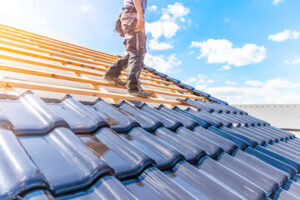Whether you’re a residential or commercial property owner, it is important to have good-quality roofing. There are a variety of choices when it comes to roofing, such as metal, membrane, composition shingles, and more. These options will depend on the style and needs of your building.

There are a variety of types of composition shingles available. These shingles are composed of man-made materials such as fiberglass, granules, and asphalt. They are also waterproof, fire-resistant, and resist algae growth. Visit the website to learn more.
These shingles are available in different colors. They are a popular choice for homeowners. They can be found in black, gray, blue, and brown. They can be easily installed.
The materials in composition shingles are a mixture of asphalt and ceramic granules. These shingles can be laminated or in single layers. The cost of composite roofing is usually less than that of asphalt shingles.
The lifespan of a composition roof depends on many factors. A properly ventilated attic can extend its lifespan, as can regular roof maintenance. The newest composition roofs are also solar-efficient. This allows them to reduce the need for re-roofing.
Choosing the right shingle is a major decision. You will need to consider the style of your home and your budget. Then you will need to decide whether or not you want a synthetic or wood shake style of shingle.
Metal roofing is available in a variety of styles and colors. It’s a popular choice for homes and commercial buildings alike. The most common materials are steel and aluminum. However, copper is also a strong contender.
In addition to being long-lasting, metal roofs are also low maintenance and recyclable. Simple annual cleaning is all that’s needed. The material is also resistant to mildew, insects, and rot.
Metal roofing is ideal for locations with tropical weather. In fact, many insurance companies offer reduced rates to owners of metal roofs.
While the benefits of a metal roof are many, there are some downsides. A common misconception is that they’re noisy. While this is not the case, a few loud gusts of wind or heavy rain can cause dents or scratches.
If you’re considering metal roofing, it’s a good idea to hire an experienced roofing contractor to do the work. Most contractors will quote you the materials plus the labor.
Membrane roofs are a great way to make your roof watertight. They can be installed on a wide range of roof types, including flat and low slopes. They are also easy to install, making them very popular. However, there are a few things to keep in mind when choosing a membrane for your roof.
Membrane roofing systems can be built using synthetic rubber, thermoplastic, or a combination of both. In general, thermoplastic membranes are stronger than thermoset membranes, which use chemicals to cross-link the material.
EPDM synthetic rubber is one of the most common membrane materials. It is a single-ply membrane and can be easily installed. The material is known for its excellent weathering properties and resistance to UV degradation. The membrane is rolled out over the roof; then, it is hot air welded to create a secure bond.
Another membrane type is PVC, which is a strong, puncture-resistant material. It is ideal for warm climates and is very durable.
Roof decks are becoming more common in urban areas, as they provide a pleasant outdoor space and add to the value of a property. A number of different materials are used for roof decks. They include lightweight structural concrete, precast concrete, and cast-in-place concrete.
A precast roof is made from an assembly of hollow form planks, which are reinforced with normal-weight concrete. It is typically finished with a membrane and foam insulation.
Plywood is a popular material for roof decks because it is dense and less susceptible to rot. It also reduces the likelihood of warping and swelling. It is also more moisture-resistant than OSB.
The construction of a deck is determined by the type of roof system being installed. If you plan to use a permanent roof, you will want to consult a structural engineer. You may need to have your deck tested to ensure that it meets all egress and exit requirements. You can get design guides from various roof-cover manufacturers.